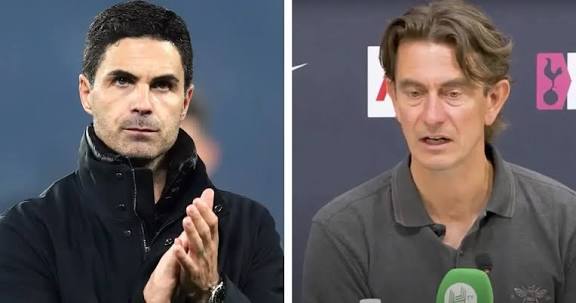Viral message from David moyes on Tottenham Hotspur borrowing from Mikel Arteta’s playbook


Tottenham Hotspur’s emphatic 3-0 victory over Everton was far more than just another away win — it was a tactical statement, a declaration that Thomas Frank’s side is not only rediscovering its winning habit but also redefining its identity. Spurs didn’t just defeat the Toffees; they dismantled them in a manner reminiscent of a team that has studied, adapted, and perfected one of its rival’s greatest strengths — set-piece mastery.
For years, Arsenal under Mikel Arteta have been praised for their precision from dead-ball situations, turning corners and free kicks into consistent sources of goals. On Sunday at the Hill Dickinson Stadium, Tottenham showed they could do the same — and perhaps even better. Both of Micky van de Ven’s first-half headers and Pape Matar Sarr’s late strike came directly from rehearsed corner routines, the kind that demonstrate not just athleticism but tactical intelligence and relentless preparation.
Everton, who had gone the entire season without conceding from a corner, were caught completely off guard. Every Spurs delivery was deliberate, every run choreographed, and every movement in the box served a purpose. The timing, accuracy, and physical presence of players like Van de Ven and Cristian Romero made it nearly impossible for the Toffees to cope. It was a performance that revealed how far Frank’s Tottenham have come — from a team once accused of being too one-dimensional to one capable of dominating the physical and strategic aspects of the game.
In many ways, imitation has become innovation. If Arteta’s Arsenal turned set-pieces into an art form, Frank’s Spurs have turned them into a weapon of war. Tottenham weren’t just efficient — they were ruthless.
Moyes Admits Everton Were Outmuscled
Everton manager David Moyes couldn’t hide his frustration after the match. Known for organizing one of the league’s most disciplined defensive units, he saw his side repeatedly undone by Spurs’ set-piece excellence — something almost unthinkable for a team that prides itself on aerial dominance.
The Toffees briefly thought they had pulled one back when Jake O’Brien headed home from a corner, only for VAR to intervene and rule that Iliman Ndiaye and Jack Grealish were obstructing Tottenham goalkeeper Guglielmo Vicario from an offside position. The decision, while correct, only deepened Moyes’ sense of exasperation.
“We’ve been undone by set-pieces, and we’re not happy about it,” Moyes admitted in his post-match interview. “There were good moments in the game, but those situations decided it. We’ve usually been very strong defending corners, but Thomas’ teams have always had that sharpness. They got their heads to them, and we didn’t.”
For Moyes, the defeat was more than a setback — it was a wake-up call. His team, who had been impeccable from corners all season, lost their defensive edge in one night to a Tottenham side that looked better drilled, more composed, and physically hungrier.
Frank’s Tactical Evolution Takes Shape
Under Thomas Frank, Tottenham are evolving into a side that marries artistry with efficiency. While Ange Postecoglou’s era was defined by high-tempo attacking football and aesthetic dominance, Frank’s approach has added structure, steel, and tactical discipline — the kind of balance that sustains title challenges.
Spurs now possess something they have long lacked: controlled aggression. With aerial threats like Van de Ven, Romero, and Destiny Udogie, Tottenham can win matches even when their fluid attacking play isn’t at its best. They can grind out victories, outmuscle opponents, and control games from dead-ball situations — traits that define mature, championship-caliber teams.
For years, Tottenham supporters have grudgingly admired Arsenal’s efficiency from set pieces, watching their rivals turn corners into key moments in tight matches. But against Everton, the roles were reversed. Spurs demonstrated that they could not only replicate Arsenal’s precision but perhaps surpass it, doing so while maintaining their own identity and style.
This was more than just a tactical victory — it was a statement of intent. Tottenham are no longer simply playing attractive football; they’re learning how to win ugly, how to dominate physically, and how to impose themselves when the rhythm of the game demands grit over grace.
If this evolution continues, the upcoming North London Derby will carry even greater significance. It won’t just be about pride or position — it will be a battle between two sides that have mastered the fine margins of elite football. And this time, Tottenham might just have the tactical edge that tips the balance their way.